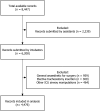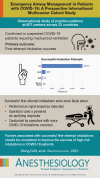Emergency Airway Management in Patients with COVID-19: A Prospective International Multicenter Cohort Study
- PMID: 33848324
- PMCID: PMC8274456
- DOI: 10.1097/ALN.0000000000003791
Emergency Airway Management in Patients with COVID-19: A Prospective International Multicenter Cohort Study
Erratum in
-
Emergency Airway Management in Patients with COVID-19: A Prospective International Multicenter Cohort Study: Erratum.Anesthesiology. 2021 Aug 1;135(2):375. doi: 10.1097/ALN.0000000000003854. Anesthesiology. 2021. PMID: 34019622 Free PMC article. No abstract available.
Abstract
Background: Tracheal intubation for patients with COVID-19 is required for invasive mechanical ventilation. The authors sought to describe practice for emergency intubation, estimate success rates and complications, and determine variation in practice and outcomes between high-income and low- and middle-income countries. The authors hypothesized that successful emergency airway management in patients with COVID-19 is associated with geographical and procedural factors.
Methods: The authors performed a prospective observational cohort study between March 23, 2020, and October 24, 2020, which included 4,476 episodes of emergency tracheal intubation performed by 1,722 clinicians from 607 institutions across 32 countries in patients with suspected or confirmed COVID-19 requiring mechanical ventilation. The authors investigated associations between intubation and operator characteristics, and the primary outcome of first-attempt success.
Results: Successful first-attempt tracheal intubation was achieved in 4,017/4,476 (89.7%) episodes, while 23 of 4,476 (0.5%) episodes required four or more attempts. Ten emergency surgical airways were reported-an approximate incidence of 1 in 450 (10 of 4,476). Failed intubation (defined as emergency surgical airway, four or more attempts, or a supraglottic airway as the final device) occurred in approximately 1 of 120 episodes (36 of 4,476). Successful first attempt was more likely during rapid sequence induction versus non-rapid sequence induction (adjusted odds ratio, 1.89 [95% CI, 1.49 to 2.39]; P < 0.001), when operators used powered air-purifying respirators versus nonpowered respirators (adjusted odds ratio, 1.60 [95% CI, 1.16 to 2.20]; P = 0.006), and when performed by operators with more COVID-19 intubations recorded (adjusted odds ratio, 1.03 for each additional previous intubation [95% CI, 1.01 to 1.06]; P = 0.015). Intubations performed in low- or middle-income countries were less likely to be successful at first attempt than in high-income countries (adjusted odds ratio, 0.57 [95% CI, 0.41 to 0.79]; P = 0.001).
Conclusions: The authors report rates of failed tracheal intubation and emergency surgical airway in patients with COVID-19 requiring emergency airway management, and identified factors associated with increased success. Risks of tracheal intubation failure and success should be considered when managing COVID-19.
Copyright © 2021, the American Society of Anesthesiologists. All Rights Reserved.
Figures





Comment in
-
Emergency Airway Management in the Time of COVID-19: Lessons for All?Anesthesiology. 2021 Aug 1;135(2):212-214. doi: 10.1097/ALN.0000000000003819. Anesthesiology. 2021. PMID: 34197577 Free PMC article. No abstract available.
-
Emergency Airway Management in COVID-19: Comment.Anesthesiology. 2022 Feb 1;136(2):394-395. doi: 10.1097/ALN.0000000000004060. Anesthesiology. 2022. PMID: 34758062 Free PMC article. No abstract available.
Comment on
-
Emergency Airway Management in the Time of COVID-19: Lessons for All?Anesthesiology. 2021 Aug 1;135(2):212-214. doi: 10.1097/ALN.0000000000003819. Anesthesiology. 2021. PMID: 34197577 Free PMC article. No abstract available.
References
-
- Cook TM, Woodall N, Frerk C; Fourth National Audit Project. Major complications of airway management in the UK: Results of the Fourth National Audit Project of the Royal College of Anaesthetists and the Difficult Airway Society. Part 1: Anaesthesia. Br J Anaesth. 2011;106:617–31 - PubMed
-
- Cook TM, Woodall N, Harper J, Benger J; Fourth National Audit Project. Major complications of airway management in the UK: Results of the Fourth National Audit Project of the Royal College of Anaesthetists and the Difficult Airway Society. Part 2: Intensive care and emergency departments. Br J Anaesth. 2011;106:632–42 - PubMed
-
- Ghebreyesus TA: WHO Director-General’s opening remarks at the media briefing on COVID-19. Available at: https://www.who.int/director-general/speeches/detail/who-director-genera.... Accessed November 8, 2020
Publication types
MeSH terms
LinkOut - more resources
Full Text Sources
Other Literature Sources
Medical

